牛津英语六年级 6AM1U2
上海版牛津英语6am1u2wb
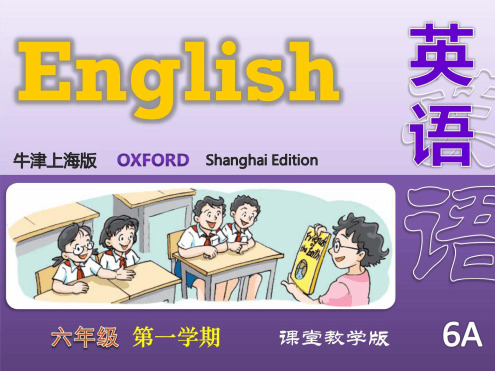
What do they like to do together?
go shopping dance ride bicycles play
1
We like to go to the supermarket together.
Skygirl and Kitty are good friends. They like to go shopping together.
4
walk to school eat their lunch
They _____a_lw_a_ys_h_e_lp_e_ac_h_o_th_e_r ____.
help each other play
help other people share their food
5
walk to school eat their lunch
Garden City Zoo. I went
there this morning.
3
I want to go to People's
Park. Have you been
there ____y_e_t___?
Yes, I've _a_l_r_e_a_d_y_ been there.
already just yet
What do they like to do together?
3
We ___l_ik_e_t_o_d_a_n_c_e_to_g_e_t_h_er______.
go shopping dance ride bicycles play
Skygirl and __S_pa_c_e_b_o_y_a_re__g_o_o_d_fr_ie_n_d_s_. They __l_ik_e_t_o_d_a_n_c_e_to_g_e_t_h_e_r ______.
新牛津6AM1U2Period 3
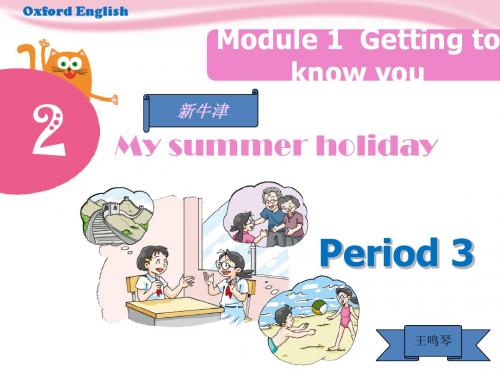
Alice: How was your summer holiday, Kitty? Kitty: It was fun. I visited ______________. I also went to ______________________. We played _________ there and went __________ in the sea. How about your summer holiday?
Alice: It was wonderful. I went to Beijing and visited my uncle. We went to the Great Wall, Tian’anmen Square and the Palace Museum. We also went to some famous parks in Beijing, and I took a lot of photos.
Alice: How was your summer holiday, Kitty? Kitty: It was fun. I visited my grandparents. I also went to the beach with my family. We played ball games there and went swimming in the sea. How about your summer holiday? Alice: It was wonderful. I went to Beijing and visited my uncle. We went to the Great Wall, Tian’anmen Square and the Palace Museum. We also went to some famous parks in Beijing, and I took a lot of photos.
牛津6A第一二单元测试卷(附答案).doc

牛津小学英语6A 第1一2单元测试卷听力部分(20分)一、听录音,选择你所听到的单词或词组。
(每小题读两遍。
10分)( )1. A. today B. stay C. way( )2. A. match B. watch C. catch( )3. A. a birthday present B. as a birthday presentC. my birthday present( )4. A. When’s you r birthday? B. When’s Teachers’ Day?C. When can we watch it?( )5. A. go to school B. go home together C. go to school on foot( )6. A. 9月10日 B. 10月1日 C. 12月25日( )7. A. stand up B. get up C. pick up( )8. A. keep off B. take off C. turn off( )9. A. the twentieth of June B. the twelfth of JulyC. the twenty-first of January( )10. A. Can I have an ice cream?B. Can I watch TV now?C. Can I play computer games?二、听录音,选择正确的应答。
(每小题读两遍。
5分)( )1. A. It is fine. B. It ’s September. C. It ’s Saturday.( )2. A. It’s Monday. B. It’s the 6th of August.C. It’s on the 6th of August.( )3. A. Yes, I can. B. Sure. C. Happy birthday.( )4. A. Yes, I am. B . No, you don’t. C. Yes, I do( )5. A. No, you can ’t. B. No, you aren ’t. C. No, you don ’t.三、听录音,完成下列句子。
牛津沪教版六年级上6AUnit1-Unit2重要知识点复习
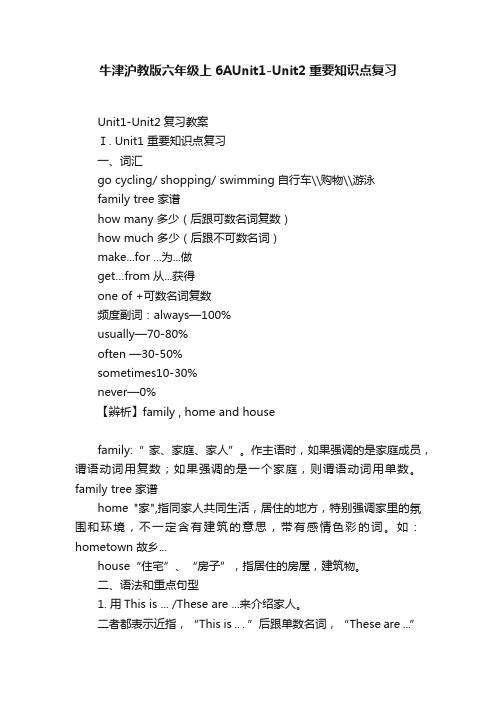
牛津沪教版六年级上6AUnit1-Unit2重要知识点复习Unit1-Unit2复习教案Ⅰ. Unit1 重要知识点复习一、词汇go cycling/ shopping/ swimming自行车\\购物\\游泳family tree 家谱how many 多少(后跟可数名词复数)how much 多少(后跟不可数名词)make...for ...为...做get…from从...获得one of +可数名词复数频度副词:always—100%usually—70-80%often —30-50%sometimes10-30%never—0%【辨析】family , home and housefamily:“ 家、家庭、家人”。
作主语时,如果强调的是家庭成员,谓语动词用复数;如果强调的是一个家庭,则谓语动词用单数。
family tree 家谱home "家",指同家人共同生活,居住的地方,特别强调家里的氛围和环境,不一定含有建筑的意思,带有感情色彩的词。
如:hometown 故乡...house“住宅”、“房子”,指居住的房屋,建筑物。
二、语法和重点句型1. 用This is ... /These are ...来介绍家人。
二者都表示近指,“This is .. . ”后跟单数名词,“These are ...”后跟复数名词或者多个不同的对象。
2.用how many 来询问数量后接可数名词的复数形式,当我们提问你有多少……时候,如果How many后跟人,常用how many... do you have?如果How many 后跟物,常用how many...have you got?3.What do you do with your... ? 和What else do you do with your... ? 来提问与家庭成员或亲戚一起做什么.else 意为别的其他的,常用于特殊疑问词或不定式之后,如what else, something else等。
牛津沪教版六年级上6AUnit1-Unit2 重要知识点复习
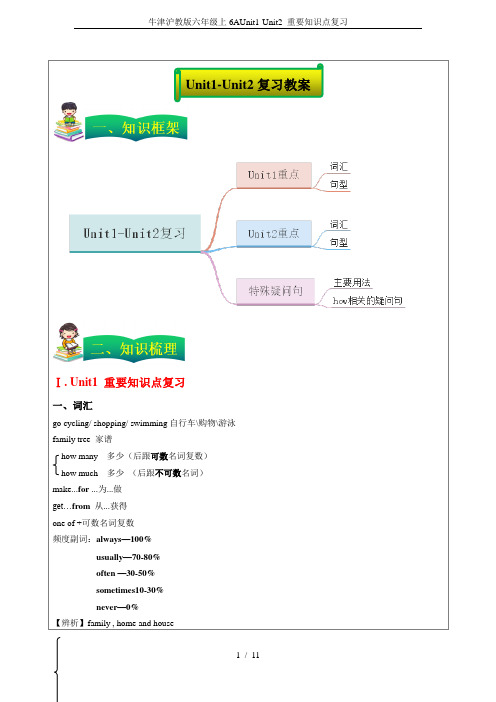
Unit1-Unit2复习教案Ⅰ. Unit1 重要知识点复习一、词汇go cycling/ shopping/ swimming自行车\购物\游泳family tree 家谱how many 多少(后跟可数名词复数)how much 多少(后跟不可数名词)make...for ...为...做get…from从...获得one of +可数名词复数频度副词:always—100%usually—70-80%often —30-50%sometimes10-30%never—0%【辨析】family , home and housefamily:“ 家、家庭、家人”。
作主语时,如果强调的是家庭成员,谓语动词用复数;如果强调的是一个家庭,则谓语动词用单数。
family tree 家谱home "家",指同家人共同生活,居住的地方,特别强调家里的氛围和环境,不一定含有建筑的意思,带有感情色彩的词。
如:hometown 故乡...house“住宅”、“房子”,指居住的房屋,建筑物。
二、语法和重点句型1. 用This is ... /These are ...来介绍家人。
二者都表示近指,“This is .. . ”后跟单数名词,“These are ...” 后跟复数名词或者多个不同的对象。
2.用how many 来询问数量后接可数名词的复数形式,当我们提问你有多少……时候,如果How many后跟人,常用how many... do you have?如果How many 后跟物,常用how many...have you got?3.What do you do with your... ? 和What else do you do with your... ? 来提问与家庭成员或亲戚一起做什么.else 意为别的其他的,常用于特殊疑问词或不定式之后,如what else, something else等。
苏教版牛津英语 6A Unit1-2
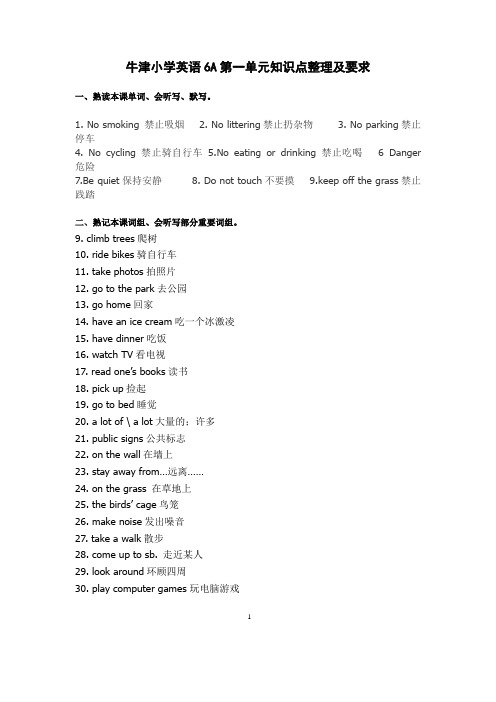
牛津小学英语6A第一单元知识点整理及要求一、熟读本课单词、会听写、默写。
1. No smoking 禁止吸烟2. No littering禁止扔杂物3. No parking禁止停车4. No cycling禁止骑自行车5.No eating or drinking 禁止吃喝 6 Danger 危险7.Be quiet保持安静8. Do not touch不要摸9.keep off the grass禁止践踏二、熟记本课词组、会听写部分重要词组。
9. climb trees爬树10. ride bikes骑自行车11. take photos拍照片12. go to the park去公园13. go home回家14. have an ice cream吃一个冰激凌15. have dinner吃饭16. watch TV看电视17. read one’s books读书18. pick up捡起19. go to bed睡觉20. a lot of \ a lot大量的;许多21. public signs公共标志22. on the wall在墙上23. stay away from…远离……24. on the grass 在草地上25. the birds’ cage鸟笼26. make noise发出噪音27. take a walk散步28. come up to sb. 走近某人29. look around环顾四周30. play computer games玩电脑游戏131. a ten-yuan note 一张十元的钞票32 four years old 四岁33 try again 再试一次34 walk on the grass在草地上走35 walk to the note 走到纸币跟前36 ask some questions 问一些问题37 different things 不同的意思38 say to Mr. Smith 对史密斯先生说39 fine ¥10 罚款10 元40 on the Internet 在网上41 play the game with your friends 和你的朋友玩这个游戏42 point to a sign on the grass 指着草地上的一个标志43 know a lot about public signs 对标志了解很多(知道有关很多标志的事)44 The sign on the bird’s cage在鸟笼上的标志45. learn more about public signs 学更多有关公共标志的知识三、熟读本课课文、能够理解运用部分重点句型。
牛津小学英语6a
牛津小学英语6A简介《牛津小学英语6A》是一本为6年级学生编写的英语教材。
它是牛津大学出版社出版的,旨在帮助学生提高英语听说读写能力。
课程内容Unit 1: Greetings本单元主要介绍问候语的用法,如Hello、Good morning 等,并通过练习帮助学生掌握这些问候用语。
学生将通过听说练习和角色扮演来增加对这些问候语的熟悉程度。
Unit 2: My School这个单元主要介绍学校生活的相关内容,包括学校设施、校服和课程等。
学生将通过听对话和朗读练习来学习如何用英语描述校园生活。
Unit 3: My Family本单元将帮助学生学习如何用英语描述自己的家人。
学生将通过听故事和填写句子等活动来提高他们的理解和运用能力。
这个单元将帮助学生学习如何用英语谈论自己的爱好。
他们将通过学习一系列的对话和练习来表达他们的兴趣爱好。
Unit 5: Food and Drinks本单元将帮助学生学习食物和饮料方面的词汇。
学生将通过听和说的练习来提高他们的英语表达能力。
Unit 6: Festivals这个单元将向学生介绍一些重要的节日,如圣诞节、感恩节等。
学生将通过阅读和问答来提高他们的阅读和理解能力。
Unit 7: Our World本单元将帮助学生了解地球和环境保护的重要性。
学生将通过观察和讨论来增加他们对环境保护的认识。
Unit 8: Jobs这个单元将介绍一些不同的职业,如教师、医生、警察等。
学生将通过听音频和配对练习来提高他们的词汇记忆和理解能力。
本单元将向学生介绍一些常见的体育运动。
学生将通过观看视频和对话练习来学习如何用英语描述体育运动。
Unit 10: Our Future这个单元将帮助学生思考自己的未来,并学习如何用英语表达自己的目标和梦想。
学生将通过写作和朗读练习来提高他们的表达能力。
学术目标《牛津小学英语6A》旨在帮助学生达到以下学术目标:•提高听力技能:通过听对话、故事和音频来提高学生的听力理解能力。
沪教版牛津小学英语6A-Module1-Unit2-period1
Unit 2 Good friendsPeriod 1Teaching aims:1.To find out the age ,heights and weights of their classmates and write a report.2. To draw a picture of a friend and write about him/her.3. To write a report about the things they usually do with their friends.Language focus and language function1. Using adjectives to make comparisons.2. Using adverbs to express frequency.3. Using “like to” to express preference.4. Using the simple tense to express actions.Teaching procedure:I. Warming-upDaily duty-work or othersII. Pre-task preparation1. Review: “dog” and “block” by showing the pictures to the students on the board( Try to remember the different housing estate the classmates live in)T: Who lives in ( name of a housing estate)?Who lives in the same housing estate?Do S1 and S2 live in the same housing estate?To elicit: Yes, they live in the same housing estate.No, they live in different housing estate.2.The whole class complete: “Look, Ask and Answer”T: Which dogs are the same?To elicit: The dogs in cage AT: Which dogs are different?To elicit: The ones in cage B3. Distribute a cope of photocapiable page 9 to each student to identify which animals in the pet shop are the same and which are different.III. While-task procedure1. Play the recording: Look and Read Students listen and follow in their books.2. Play the recording again Students listen and repeat3. Give the students a few minutes to read the passage silently.4. Ask the students to read the five sentences in Answer True/false.5. Tell the students to close their booksT: Who is your good friend?How old is he/she?What do you like to do together?To elicit: _________is my good friend. He /She is _______ yeas old. We always /usually /sometimes ________ together.6. Distribute a copy of Photocopiable page 10 to each student to tick the things they and theirfriends do together. Then they write them in complete sentencesIV. Consolidation:Grammar practice Book A Page 4-5.。
上海版牛津英语6A M1U2 WB
Look and write • Look
I promise
to
keep
பைடு நூலகம்
the beach clean beach
not to pollute the
.
What does Skygirl promise to do?
1
keep
beach promise the
to
clean
I
the beach I promise to keep ___________ clean _________________________.
already Yes, I’ve ________ been there.
already just yet
4
I want to go to Ocean Park. Have you been
yet there _________?
already Yes, I’ve ________ been there.
1 Zhongshan Park
Yes Yes No No
No No Yes Yes
2 Garden City Zoo
3 Ocean Park
4 People’s Park 3
been to Ocean Park yet Miss Guo: Have you _______________________? I haven’t been to Ocean Park/there yet Skygirl: No, ____________________________________. I’ve already been to Ocean Park/there Spaceboy: Yes, ___________________________________.
东京牛津版英语六年级第一学期6A期末复习知识点总结
东京牛津版英语六年级第一学期6A期末复习知识点总结Unit 1 - Hello!- Greetings: Hello, Hi, Good morning, Good afternoon, Goodnight, How are you?, I'm fine, thank you.- Introducing yourself: My name is [name], I'm [age] years old, I'm from [place].- Classroom phrases: Sit down, Stand up, Raise your hand, Can I go to the washroom?, May I drink water?, Thank you.- Numbers: Cardinal numbers 1-20, Ordinal numbers 1-10.Unit 2 - My Family- Family members: mother, father, sister, brother, grandparents.- Describing family members: She is my mother. He is my father. They are my grandparents.Unit 3 - My Classroom- Classroom objects: books, desks, chairs, pens, pencils, erasers.- Prepositions of place: on, in, under, behind, in front of.Unit 4 - My Body- Parts of the body: head, eyes, ears, nose, mouth, hands, feet.- Actions: touch, see, hear, smell, taste, move, jump.Unit 5 - My Day- Daily activities: wake up, get dressed, brush teeth, eat breakfast, go to school, have lunch, play games, do homework, go to bed.- Telling time: o'clock, half past.Unit 6 - My School- School subjects: English, Math, Science, Music, Art, P.E.Unit 7 - My Food- Food vocabulary: fruits, vegetables, snacks, drinks.- Expressing likes and dislikes: I like [food]. I don't like [food].Unit 8 - My Clothes- Clothing items: T-shirt, pants, dress, skirt, shoes, hat.- Colors: red, blue, yellow, green, purple, orange.Unit 9 - My House- Rooms in a house: living room, bedroom, kitchen, bathroom, dining room.- Furniture: sofa, bed, table, chair, refrigerator.Unit 10 - My City- Places in a city: park, supermarket, hospital, school, zoo, restaurant.- Modes of transportation: car, bus, train, bicycle, walking.Unit 11 - My Holidays- Holiday activities: go shopping, have a picnic, visit relatives, watch movies, play games.- Holidays: Christmas, New Year, Easter, Halloween.Unit 12 - Review- General review of all units.- Practice exercises to reinforce learning.以上是东京牛津版英语六年级第一学期6A期末复习的知识点总结。
- 1、下载文档前请自行甄别文档内容的完整性,平台不提供额外的编辑、内容补充、找答案等附加服务。
- 2、"仅部分预览"的文档,不可在线预览部分如存在完整性等问题,可反馈申请退款(可完整预览的文档不适用该条件!)。
- 3、如文档侵犯您的权益,请联系客服反馈,我们会尽快为您处理(人工客服工作时间:9:00-18:30)。
6AM1U2
知识点
1) 询问信息
(1) A: What do you like to do with your friend? 你和朋友喜欢做什么?
B: We like to ... together. 我们喜欢一起做……
(2) What do you like about him / her? 你认为他/她怎么样?
(3) How can we look after the environment? 我们怎样来照顾环境?
2) 描述
(1) We like to be together. 我们喜欢在一起。
(2) She is always hardworking and she always keeps her promise. 她总是很努力工作并遵守她的诺言。
3) 表示承诺
We promise to ... 我们承诺做……
4) 一般现在时第三人称单数做主语的陈述句:
e.g. She is always hardworking and she always keeps her promise.
She is never angry.
She never tells a lie.
5) already, just和yet的用法:
(1) 时间副词:already (已经),just (刚刚),yet (还);already和just用于肯定句,置于句中、句尾皆可,yet用于否定和疑问句中,一般置于句尾。
常用于现在完成时中,现在完成时表示过去发生的事情对现在造成的影响,其基本形式:have / has + 过去分词
e.g. Have you been to the Ocean Park yet, Winnie? 温妮,你曾经去过海洋公园吗?
No, I haven't been there yet. 不,我还没有去过那里。
Yes, I've already been there. 是的,我已经去过那里。
Yes, I've just been to the Ocean Park. 是的,我刚刚去过海洋公园。
(2) have been to ... 和have been there…的区别
e.g. I have already been to Shanghai Museum. 我已经去过上海博物馆。
I have just been to Oriental Pearl TV Tower. 我刚刚去过东方明珠电视
塔。
Oriental Pearl TV Tower is one of the tallest towers in the world. I have already been there. 东方明珠电视塔是世界上最高的塔之一。
我已经去过那里。
单词默写
,,,
1)He hasn't gone (还) .
2)Humans may be able to live in the depths of the (海洋) some day.
3)The old man (几乎;差不多) never goes outside in the winter.
,,,
4)Peter has (已经) finished the homework.
5)We must make a lot of rules and laws to keep our (环境) clean and tidy.
6)She was not as (朋友般的;友好的) to him as before.
,,,
7)I'm sorry, smoking will (污染;弄脏) air in the taxi.
8)To get up early is (有帮助的;有益的) .
9)I (允诺;承诺;答应) to take you to the cinema tomorrow.
,,,
10)What shall people do now to fight the noise (污染) ?
11)We can (再使用) bags and other things.
12)I will (离开) off at Naijing road.
,,,
13)It is hard to tell the twin brothers one from the (另一个人) .
14)The man walked (到……里面) the house in the dark.
15)Most animals live on (陆地;土地) .
词组默写
1.I have (p) (t) (承诺做某事) help Xiao Ming with his math.
2.I (w) (t) (s) (走路去学校) everyday.
3.Don't (l) (r) (遗留垃圾) in the park.
4.There is nobody to (l) (a) (照料;照顾) the baby.
5.I think we should (t) (t) (与...谈话) foreigners as friendly as possible.
6.People shouldn't (p) (t) (e) (污染环境) .
7.There is no (r) (b) (垃圾箱) here.
8.We have (a) (p) (空气污染) .
9.Let's (d) it (w) (和……讨论) our classmates.
10.Don't (b) (l) (f) (迟到) school again.
11.I have good news to (s) (w) (与...分享) you.
12.It's a (l) (d) (小狗) .
13.Don't (t) (l) (撒谎) , boys!
14.Please (p) the rubbish (i) (放入) the dustbin.
15.I still remember skating with my father on the lake (f) (t)
(f) (t) (第一次) .
16.What (a) you (g) (t) (打算) do tomorrow?
17.We should (b) (k) (t) (对…….和蔼) animals.
18.They are the (f) (o) (t) (e)
(地球之友) .
19.These are my (f) (m) (家庭成员) .
20.He has (g) (a) (生气) .
21.We have some (s) (b) (购物袋) .
22.You should (k) your room (c) (保持干净) .
23.The environment is (a) (t) (t) (所有的东西) round us.
24.I have a friend. She (l) (t) (喜欢) play.
25.We have (w) (p) (水污染) .
26.We have (l) (p) (土地污染) .
27.Kitty and Alice are (a) Winnie (a) (关于某事问某人) where she has been in Garden City?
28.His temperature seems to be (a) (r) ((病)好了) .
29.Please (w) (h) (努力工作) .
30.Teachers always (t) us (t) (告诉…….做某事) go to school on time。
